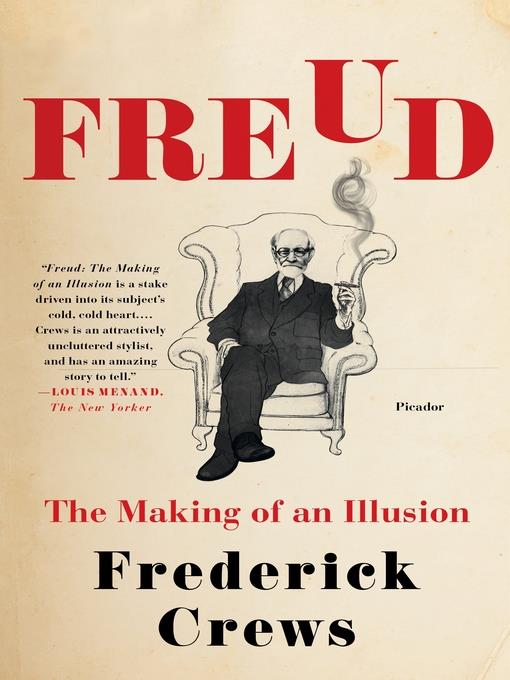
Freud
The Making of an Illusion
فرمت کتاب
ebook
تاریخ انتشار
2017
نویسنده
Frederick Crewsناشر
Henry Holt and Co.شابک
9781627797184
- اطلاعات
- نقد و بررسی
- دیدگاه کاربران
نقد و بررسی

June 26, 2017
With his typical rapier wit and swaggering prose, Crews (Follies of the Wise) reveals that the emperor of psychoanalysis is wearing no clothes. In exhaustive and sometimes repetitious detail, he lays out a stunning indictment of Sigmund Freud. Crews illustrates Freud’s tendency to rush to judgment by describing how, early on, Freud developed a promising but ultimately flawed slide-staining method; hurrying to report his findings, Freud failed to disclose the method’s flaws, a pattern he would repeat throughout his life. During the 1880s, he tried, disastrously, to wean patients off of morphine with cocaine. With this treatment and the papers he wrote about it, Freud developed a habit of “failing to pursue an inquiry to its logical end” and “cutting as many corners as he could.” In his later work, such as his Studies on Hysteria, Freud wrote case histories that read more like mystery stories than scientific reports; Crews intriguingly notes that Freud was a Sherlock Holmes devotee and suggests that the psychoanalyst may have been emulating the fictional sleuth. This drawn-out but fascinating biographical study paints a portrait of Freud as a man who cared more about himself than his patients and more about success than science.

Starred review from June 15, 2017
A thorough debunking of the Freud legend by an accomplished author and academic.In this elegant and relentless expose, New York Review of Books contributor Crews (Emeritus, English/Univ. of California; Follies of the Wise: Dissenting Essays, 2006, etc.) wields his razor-sharp scalpel on Freud's slavish followers, in particular, who did not want to see or who willfully redacted the sloppiness of Freud's research methods in order to "idealize him." The author sees a blackout of sorts by what he calls the Freudolatry, or the coterie of Freud apologists, from Anna Freud to many scholars down the line, who have limited access to his letters or correspondence between young Freud and his then-fiancee, Martha Bernays, between 1882 and 1886. This was the crucial period in the formation of his "seduction theory" and establishment as a specialist of nervous concerns among patients (largely well-off Jewish women) in Vienna. Having studied briefly with Jean-Martin Charcot of the Salpetriere in Paris, Freud styled himself as an expert in hypnosis, Charcot's specialty in the treatment of hysteria, a catchall term for women's nervous disorders. In his Vienna practice, Freud's advocacy of the use of cocaine and other drugs as a panacea would bring him notoriety and even disgrace--e.g., using cocaine to "cure" his friend Ernst Fleischl von Marxow of morphine addiction. Eventually, Freud became dependent on cocaine and self-administered it throughout these years of feverish writing and developing his early psychoanalytic theories. Crews carefully digs through Freud's free-wheeling handling of facts, especially regarding the idea of "repressed memory of a sexual trauma"--e.g., the case of Bertha Pappenheim, aka Anna O. The author also reveals how many other theorists before Freud were exploring the role of the unconscious in psychoneuroses, which contradicts his self-depiction as a pioneer in the field, as well as how his editors tweaked the record. Crews comes to bury Freud, not to praise him, and he does so convincingly. Impressively well-researched, powerfully written, and definitively damning.
COPYRIGHT(2017) Kirkus Reviews, ALL RIGHTS RESERVED.

Starred review from August 1, 2017
Writing in 1922 to Sigmund Freud, the disgruntled husband of a woman undergoing psychoanalysis challenged the famous psychologist: Great Doctor, are you a savant or a charlatan? In this devastating expose, Crews answers that question with stunning clarity. The marvel that Crews labors to illuminate is Freud's success in hiding his charlatanry while erecting a towering reputation as a visionary therapist who healed individual patients while ushering the entire world into a new era freed from stultifying inhibitions. Why has Freud's iconic cultural image endured even as psychiatric science has discredited his psychological theorizing? Readers soon realize that the Master cunningly rendered his new paradigm of the mind secure against empirical critique by transforming it into a cult faith sustained by fiercely loyal disciples. But Crews relentlessly shreds the deceptions that Freudians even now try to maintain. Trumpeted as a daring breakthrough, Freudianism incorporated concepts the Viennese physician borrowed from mentors he idolized, then betrayed. Framed as the distillation of lessons learned through successful treatments of many patients, Freud's psychoanalytic method, Crews argues forcefully, emerged with a thinand mendaciously editedcase history. Disguised as objective truth, Freudianism bore the marks of its creator's deep-seated insecuritiesand guilt. This thorough dismantling of one of modernity's founding figures is sure to be met with controversy.(Reprinted with permission of Booklist, copyright 2017, American Library Association.)

March 15, 2017
Revisionist isn't the word. Crews, professor emeritus of English at Berkeley, has always challenged the mystique surrounding Sigmund Freud and here sets about to dismantle him completely, arguing that he falsified case histories, appropriated the works of others, betrayed colleagues, dealt irrationally with patients, failed to comprehend key psychological issues of the day, and hooked unfortunates on cocaine. Yet his star hangs high in the sky because he was a master of self-invention and promotion.
Copyright 2017 Library Journal, LLC Used with permission.




دیدگاه کاربران